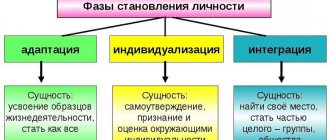When a child enters a kindergarten or school, he is just beginning to learn how to communicate with his peers. And he inevitably faces the fact that his interests do not coincide with the interests of other children. This creates a conflict, which even a schoolchild or teenager is not always able to resolve properly.
In this article we will talk about how to teach a child to stand up for himself, what ways out of a conflict situation exist, and whether parents should intervene if a son or daughter cannot independently fight back against offenders.
Conflicts in children's environment
Children can encounter disagreements with peers at any age.
Toddlers and preschoolers
At 2-3 years old, conflicts between children can arise due to:
- awkwardness and clumsiness when one baby accidentally pushes another;
- desire to possess someone else's toy;
- “wars” for territory (the child “favored” the slide and does not let anyone there).
It is impossible to predict the occurrence of such situations. Therefore, mothers and fathers should be especially careful when going for a walk to the playground in order to prevent an impending quarrel in time.
At the age of 4-6 years, the causes of discord between children are:
- envy of other people's successes;
- jealousy of adult attention;
- resentment towards a peer for not sharing a toy or sweets.
At this age, preschoolers can often provoke conflicts themselves, and will punish the one who first used force.
Junior schoolchildren
At primary school age, the reasons for disagreements between children remain the same as in kindergarten. Added to these are envy of good grades and the teacher’s favor, as well as hostility towards those children who are somehow different from others: wear glasses or have problems with being overweight.
The guys begin to come up with offensive nicknames and tease the “black sheep.” This happens both in order to attract attention and amuse others, and with the desire to assert oneself at the expense of the weak.
Teenagers
The desire to humiliate an opponent at the expense of one’s own importance increases during adolescence .
Many people are faced with the phenomenon of bullying, which can occur in real life (remember the movie “Scarecrow”) and on the Internet (this phenomenon is called “cyberbullying”).
As a rule, the victims of bullying are quiet, shy children who do not know how to fight back their bullies. The reasons for bullying can be any detail that distinguishes a child from his peers.
And if at primary school age bullying is limited to inventing offensive nicknames and teasing, then teenagers often use physical force against the “victim”.
As practice shows, moralizing conversations with the instigators of bullying and appeals to conscience do not save. If adults do not intervene in the situation in time and stop the conflict, everything can end very sadly.
In addition to bullying, disagreements between teenagers can be caused by:
- competition for the attention of the boy or girl you like;
- attempts to gain the favor of an authoritative teacher or coach;
- desire to occupy a certain status in the group.
As you already understand, any conflict between children requires resolution. But what is the best way to do this? Is it worth giving back to offenders or is it better to solve everything with words?
We'll talk about this further.
A volley of rudeness... with blanks
Good people and glossy magazines love to give two popular mutually exclusive recommendations: leave or fight back. The first option is the simplest thing you can do. “Be higher!”, “Don’t pay attention!” — you probably remember these tips that were given to you in abundance by your mothers and teachers as a child. And you left, swallowing tears, and then for a long time you replayed the situation in your memories and could not get rid of the feeling that although you listened to an authoritative person, you still did something wrong.
“All simple methods are similar to cheap medicine,” says Daria. - They have a very strong side effect. To remain silent, to push your resentment deeper, not to respond to humiliation - this means creating problems for your own psyche. I call it adrenaline intoxication. This can affect a person’s condition in any way: there are cases when people, poisoned by their own silence, began, for example, to lose consciousness in public places. Others developed persistent hypertension or somatic disorders.
The second way suggests itself - to be rude in response, or at least try. Many even make homemade preparations: “And she’ll tell me something like this, and I’ll answer her like this!” The effectiveness of this method can be measured in negative numbers, but the main thing is that more than 60% of such attempts only lead to regret: “Why did I even get involved in this?”
— It’s one thing if a stranger turns out to be a boor. And if it’s a relative, colleague, friend, this also happens, and very often. So you can add damaged relationships to the list of unpleasant consequences. Combined with feelings of regret and guilt - a thermonuclear mixture. - Daria adds.
Teaching a child to defend himself
What is better - to be able to stand up for yourself or to fight back?
Many parents (especially dads of boys) tell their children: “You have to be able to stand up for yourself.” But usually they do not specify how exactly the child should do this or only imply the use of physical force.
Let's figure out what the concepts of “defend yourself,” “fight back,” and “stand up for yourself” mean.
Defending yourself means using defense, showing your confidence and ability to resist offenders. And in order for a child to be able to do this, parents must psychologically prepare him for conflict situations that may happen to him and explain how to behave depending on the circumstances.
For example, if your desk neighbor calls you a greedy person, you don’t have to hit him over the head with a textbook or use your fists. But if he extorts money from you or, together with other guys, begins to bully and humiliate you, your reaction should be completely different.
Ways out of a conflict situation
In order for a child to gain the necessary experience of communicating with people and the world, he needs to learn how to resolve conflict situations. Of course, at a certain stage of development his parents can do this for him, but in the future he must find a way out of an acute situation himself.
Let's look at the main ways to resolve conflict available to children:
Rivalry
If a child chooses this strategy, it means that he will defend his interests to the end by all means available to him, not excluding the use of physical force.
Avoiding conflict
A schoolchild or teenager refuses to enter into dialogue with the offender and does not strive to fight back.
Compromise
The path of compromise involves the desire to come to an agreement with an opponent, sometimes with the help of deception and flattery.
Smoothing out the conflict
The child sacrifices his interests in favor of his opponent (gives away his toy or sweets, lets his homework be copied).
A break up
This is the cessation of all communication with an opponent, a demonstration of deep resentment and hostility to him. This strategy is often used by preschool children.
Cooperation
The path of cooperation with the offender requires a high level of behavioral culture and developed communication skills from the child. This strategy involves negotiations, joint search for solutions and constructive resolution of conflict.
The parents’ task is to tell their child about all the ways out of a conflict situation and discuss them.
The choice of a specific behavior strategy will largely depend on the situation itself and on the child’s ability to assess the danger that threatens him.
It would be stupid and unsafe for a first-grader to defend his property or use physical force if hooligans attack him at the entrance. But at the same time, it’s worth fighting back against the neighbor boy who extorts money from those who are younger. If the child cannot do this himself, he must tell adults about what is happening.
Is it worth teaching a child to fight: pros and cons
As we have already found out, conflicts in a child’s life are inevitable. But he must definitely learn to solve them in order to gain confidence in himself and his own abilities.
It's no secret that in our society the main way to resolve all acute situations is to use fists. Even the expression “fight back” implies the use of physical force, and not verbal defense of one’s interests.
So is it worth teaching a child to defend himself against offenders with his fists? The opinions of parents on this issue are diametrically opposed.
We decided to consider all the pros and cons in this matter.
Arguments for":
- A child, mastering the elements of self-defense, will be able to defend himself in any situation, including from an attack by hooligans.
- A schoolchild or teenager will feel confident in their own abilities in any acute situation.
- If a child is involved in wrestling, this has a positive effect on his health, develops endurance, discipline and endurance.
Arguments against":
- Getting used to using fists, the child will consider this method as the only possible way to resolve the conflict.
- When giving their son or daughter the go-ahead to use physical force, parents do not take into account the fact that the child will use it against everyone, including weak opponents.
- A child can cause severe physical harm to someone, for which his parents will have to answer.
- There are often cases when a child does not take into account the physical capabilities of the opponent. As a result, he turns out to be stronger, and your son or daughter may get injured and damaged.
As we see, there are still more arguments “against” this issue. Therefore, it is important for parents to teach their child a simple rule: if you get hit, you need to protect yourself and you can hit back, but never raise your hand first, especially against girls and those who are weaker than you.
What to do if a child cannot resist in a quarrel?
Parents are often upset by the fact that the child seems to know all the ways to resolve conflicts, but in a critical situation he gets lost and cannot fight back against the offenders.
There may be several reasons for this:
Psychologically dysfunctional family environment
If dad often insults and humiliates family members, and they, in turn, cannot defend themselves in any way, the child’s position of victim is reinforced. And in any cases of aggression from other people, he falls into a stupor and cannot stand up for himself.
Or a strong-willed and self-sufficient mother does not give the child the opportunity to resolve a conflict situation on his own, preferring out of habit to take everything upon himself and show the offenders of his son or daughter “where the crayfish spend the winter.”
In both cases, children live for years with the attitude “I’m weak, I can’t protect myself.”
Characteristics of the child
It is more difficult for closed, vulnerable and shy children to resist in conflict situations.
Parental behavior
The child sees that parents sometimes cannot defend their own rights. For example, if the neighbors behind the wall listen to music loudly at night, mom and dad prefer not to pay attention to it, instead of talking to them or calling the police.
Incorrect parental settings
From childhood, a child is taught that “it’s not good to be greedy, you need to share with everyone” or “only bad boys and girls fight.”
As a result, when a child is faced with an attack on his property or physical aggression from peers, he is subconsciously afraid of being judged by his parents and does not take any action.
We figured out the reasons. Now let's talk about what actions parents should take to help their child become more confident in their abilities.
How to help a child?
- First of all, the child should feel that you are on his side and will always come to his aid. Do not scold or shout at him, this will lead to the opposite result - the child will feel even weaker and helpless.
- Explain to your son or daughter that his interests are no less important than the interests of other children, and sometimes you need to be able to protect them.
- If the child is still small and is not able to repel the attacks of other children, parents need to resolve the conflict situation themselves on the playground or on a walk. Then gradually give the child more independence in this matter, observing how events develop, and being ready to always come to the child’s aid.
- Together with your child, develop an algorithm for dealing with conflict:
- if it concerns an attack on a toy or other property, the child must say: “This is my toy, I haven’t finished playing with it yet. Give it back to me, please!”;
- in case of physical aggression from the enemy, the following phrase will help: “It hurts me. If you don’t stop doing this, I won’t communicate with you anymore and I’ll tell the adults everything”;
- if the offender continues the attack, you should stop him yourself or with the help of a teacher, teacher, or any adult nearby.
These situations can be reinforced in a game or conversation on the topic “What will you do if...” (they call you names, you are attacked by hooligans, etc.).
"Vicious Circle"
It’s terrible, but it’s a fact: neither a higher education with honors, nor an excellent career, nor a good financial base - nothing in the world guarantees protection from assault in everyday life.
There are still many men in society who believe that many women deserve to have their hands raised against them. As a result, the compass needle shifts from “guilty because it hits” to the side “if it hits, it means it deserves it.” Where can we fight back against the offender!
Thanks to this, a woman can live for decades in conditions that any international conventions qualify as torture, and consider herself guilty of the circumstances: “If I were good, if I behaved correctly, I wouldn’t beat you.”
How to get out of the vicious circle? How to stop domestic violence?
| ⇒ |
How should parents behave in the event of children's conflicts?
If a child finds himself in a difficult situation, the first instinct of parents will always be to help, protect and punish the offenders.
But if you resolve any conflict for a child, he will remain timid, fearful and unprepared for adult life. As practice shows, it is also impossible to ignore the problems of a son or daughter, because the outcome may be sad. So where is the golden mean?
Let's figure out how parents can help their child in a conflict situation, and what not to do.
Early age
A child at this age is just learning to communicate with peers and adults and does not always know how to protect himself in a given situation. Therefore, parents should always guard the interests of the child and ensure that an innocent game on the playground does not escalate into a fight.
Your actions in case of conflict:
- When you see a quarrel starting, go up to the kids and find out what’s going on.
- If a toy was taken away from your son or daughter, ask the offender to return it. And if your child himself provoked the conflict, explain to him that it is not good to do this and together with him return his property to the owner.
- If the quarrel is related to the desire to sit in that beautiful car or ride on that wonderful slide, try to distract the child’s attention: “The slide is busy now, you need to wait a little. In the meantime, you and I will go look at the little ducks and feed them bread.”
- If you notice that another child is swinging at your child to hit him, grab the child’s hand and explain in a calm tone that he is doing wrong, and you do not allow him to offend your son or daughter.
- If a fight starts, separate the kids, calm them down and take them home.
What not to do:
- fiercely protect the baby’s property, taking it away from other children;
- scream at the offender and his parents;
- stand by when children start fighting.
By watching how the mother calmly reacts to the situation, the child learns similar behavior in the future.
Preschool age
The older a child gets, the more he learns about the world and relationships between people. And he gradually learns to resolve tense situations on his own, without the help of his parents.
Your actions in case of conflict:
- Having learned about a quarrel or fight between a child and a peer, try to find out all the circumstances of what happened not only from the child himself, but also from the teachers.
- Find out from your son or daughter what he thinks about the conflict, what feelings he has, and whether he could have acted differently.
- Try to convince the child of the need for reconciliation with the offender.
What not to do:
- threaten the offender (uncle policemen, the terrible Baba Yaga, who will definitely take the fighter to her place, and others);
- express your dissatisfaction with the kindergarten workers that they did not prevent the conflict between children;
- without understanding the situation, declare the child to blame for the quarrel and publicly reprimand for what he has done;
- calling your son or daughter a weakling, unable to fight back the offender.
It will be useful to consider with your preschooler various options for the development of conflict situations from cartoons and books and discuss what the child thinks about this.
School age
School conflicts can be provoked by seemingly unimportant reasons: someone pushed someone, didn’t let someone copy their homework, called someone an offensive word. But the consequences of such conflicts can be the most serious, and if they are not resolved in time, the child may subsequently develop complexes and serious psychological problems.
Your actions in case of conflict:
- Closely monitor the physical and mental state of the child. If he has become withdrawn, depressed, and often “goes” into the virtual world, it’s time to sound the alarm.
- Find out the reasons for your child's disagreements with peers. If he doesn’t want to talk about it with you, ask for help from your grandmother, brother, or someone with whom the child has a close and trusting relationship.
- If a child is being bullied or classmates extort money from him, involve the class teacher, school management, and parents of the offenders in solving the problem. Don't ignore the situation.
- Be on your child's side. If he is the instigator of the conflict, try to correctly convey to him all the wrongness of the actions, as well as the consequences of such behavior.
What not to do:
- ignore conflicts at school;
- at the slightest disagreement between the child and his peers, go and complain to the teacher or director;
- shame a child for not being able to stand up for himself.
Make sure your child is not bullied at school and has no problems communicating with peers. Always know where he is now and where he was during the day, listen to what is happening around him and quickly call him with the “Where are my children” application.
Adolescence
Children at this age react very painfully to conflicts, especially if the teenager is faced with a situation of bullying. Serious disagreements with peers, teachers or parents can cause nervous breakdowns, depression, and in severe cases, provoke suicide attempts. To prevent this, parents must closely monitor the psychological state of the child and promptly provide assistance in solving acute situations .
Your actions in case of conflict:
- Teenagers rarely tell their parents about their quarrels and disagreements with peers. If you suspect that your son or daughter is in a state of conflict, try to find out from him in a calm atmosphere what happened. Listen silently to the child without interrupting.
- Ask what your teen thought about the situation and what steps he took to resolve it. Develop a joint action plan to resolve the conflict.
- Make it clear that you are always on the child’s side and can protect him if he asks you to do so.
What not to do:
- point out to the child his mistakes and read notations. Most likely, he already understands that he did wrong. Don't add to his guilt;
- impose their assistance in resolving the conflict. Yes, sometimes it is really necessary. But when the mother of a 15-year-old teenager goes to deal with the neighbor boys because they are teasing her son, it looks funny and ridiculous. You will not help the child in this way, you will only aggravate the problem ;
- hope that the teenager will resolve the conflict situation himself, because he is already an adult;
- call to fight back against offenders with fists. It is unknown who will be stronger: your son or a group of angry teenagers.
How to understand that you are being bullied and what it can lead to
Of course, workplace bullying is different from school bullying. No one will write “Vasya is a fool” on the board and steal your homework notebook or sports uniform. No one will be pinned down in the toilet or locker room, beaten or outright humiliated. At least the chances of this happening are quite low.
But this does not mean that bullying at work is harmless. The aggressors just use different techniques.
They may make caustic remarks or offensive jokes at you, pointedly ignore you, misinform you so that you fail at a task and present yourself in an unfavorable light to your boss, criticize harshly, dump additional work on you, spread gossip, leave anonymous complaints, even steal or damage your things and documents.
The reason for bullying can be anything: appearance that is far from beauty standards, kindness and gentleness, impressive career successes and the favor of superiors. If you have become a victim of bullying, do not look to yourself for the reasons. The aggressor is always to blame. Yes, he is often pushed into bullying by personal problems. Why Do People Bully? The Scientific Reasons / Ditch the Label: stress and psychological trauma, self-doubt, past violence. But this does not relieve him of responsibility.
If you feel bad at work, and the prospect of interacting with colleagues causes fear, then you should under no circumstances turn a blind eye to it.
Those who are bullied for a long time are not only less productive. They also risk their health: bullying leads to B. Verkuil, S. Atasayi, M. L. Molendijk. Workplace Bullying and Mental Health: A Meta-Analysis on Cross-Sectional and Longitudinal Data / PLoS ONE to Depression, Anxiety Disorder, and Panic Attacks. Bullying also increases T. Xu, L.L. Magnusson et al. Workplace Bullying and Workplace Violence as Risk Factors for Cardiovascular Disease: A Multi-Cohort Study / European Heart Journal Xu, L.L. Magnusson Hanson et al. Workplace Bullying and Violence as Risk Factors for Type 2 Diabetes: A Multi-Cohort Study and Meta-analysis / Type 2 Diabetologia.
Advice from psychologists to parents and children
In order for a child to grow up strong and confident, as well as able to behave correctly in a conflict situation, parents must follow certain rules of upbringing:
- Teach your child to admit their mistakes and take responsibility for them. Yes, he really was wrong for pushing the boy on the playground. Yes, he’s really wrong for being greedy and not giving his sister half the chocolate. The child must find the strength to admit that he is wrong and correct the situation. Apologize, offer to play together or give your sister a beautiful keychain. When your son or daughter takes responsibility for his own behavior, he will become much more confident.
- Remember the basic rule - conflict is resolved not only with fists. Calmness and a confident tone of conversation can discourage offenders for a long time.
- An important skill in your child’s life will be the ability to say “no.” If a son or daughter doesn’t want to, he is not obliged to let his classmates copy their homework or share the donated chocolate. It’s good to be kind, but you shouldn’t allow someone to take advantage of your kindness.
- Learn to calmly respond to ridicule and name-calling. Explain to your child that verbal aggression, as a rule, is used only by weak individuals to assert themselves at the expense of others. The best way out of this situation is to ignore them.
- The child should know that it is better to immediately tell his parents about all troubles. Don't be shy to ask for help. Parents will always give the necessary advice, support and protect.
- Introduce sports into your child's life. They will help him develop patience and endurance, as well as willpower and self-confidence.
- It will be useful to learn how to win over other people. Even the most notorious offender can turn out to be a good friend and loyal comrade. Try to find common ground with him. Maybe you have a common hobby or you both love animals.
- Conflicts, ridicule and humiliation are, of course, unpleasant, but not fatal. It is important that the child learns to cope with negative emotions and not react too painfully to acute situations.
- Talk with your child more often about his school and extracurricular activities, take an interest in his relationships with classmates. Pay special attention to the child’s psychological well-being.
Conflicts in a child's life are inevitable. But to learn how to solve them correctly, you don’t have to use your fists. It is enough to be a strong and self-confident person, able to defend your own opinion and not follow the lead of offenders.
Method three. "Yes darling!"
Agree with the boor. But only on what we can really agree on. That is, he has the right to have his own position on a specific issue. For example, many have sworn girlfriends or malicious colleagues who will not miss the opportunity to sharply note that they do not like your makeup, the new suit categorically does not suit you, your legs are too short, and the last report you made is beyond any criticism . What to do? Agree! “Yes, Irina Viktorovna, you and I really have different tastes! Don't like my suit? Perhaps he is not your style! Are your legs different? Yes, I was unlucky. There's nothing to be done - legs are not a luxury, but a means of transportation! Is the report bad? I agree, he is imperfect. I'm working on it."
It may seem that all these methods are based on a fair amount of tediousness. Not without it. But here, choose what is closer to you - the silent experience of someone else’s rudeness, reciprocal rudeness or polite calm.











